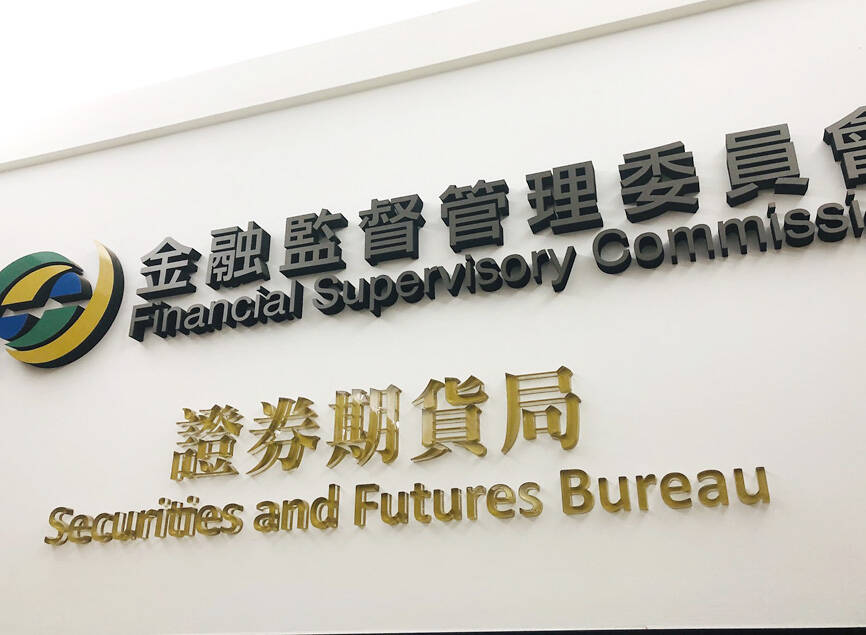The Financial Supervisory Commission (FSC) yesterday dismissed rumors that it plans to tighten rules on high-dividend exchange-traded funds (ETFs), adding that its focus is on improving oversight of products that use “income equalization reserves” for dividend payouts.
There are no new restrictions targeting high-dividend ETFs, the FSC said in a statement.
High-dividend ETFs are among the most popular investment products in Taiwan.

Photo: Kelson Wang, Taipei Times
The clarification came after reports sparked concern that the regulator was curbing dividend distributions.
The FSC in November 2023 introduced a directive requiring asset managers to enhance internal controls and prevent the misuse of income equalization reserves to artificially inflate yields.
The reserves, funded by investors’ subscription payments, should be used sparingly to ensure transparency and safeguard investor interests, the regulator said yesterday.
“The requirement is intended to enhance investment safety and accountability, and should not be interpreted as a means to suppress high-dividend ETFs,” it said.
ETFs account for more than 66 percent of Taiwan’s public fund assets, with high-dividend ETFs representing nearly half of the equity ETF market.
The high-dividend products are particularly popular among retirees and income-focused investors, analysts have said.
The FSC said that it has not prohibited distributions from dividends or capital gains, disputing claims by some stock analysts and social media commentators.
The Securities Investment Trust and Consulting Association (投信投顧公會) last month issued guidelines to help fund managers comply with the 2023 directive after identifying inconsistencies in industry practice.
Yesterday, the regulator said that the association’s guidelines do not restrict dividend or capital gains payouts, and are not intended to suppress high-dividend ETFs.
Some high-dividend ETFs have recently experienced fund outflows, which analysts attributed to market speculation about stricter payout rules.
Leading fund houses — including Yuanta Securities Investment Trust Co (元大投信), Cathay Securities Investment Trust Co (國泰投信) and Capital Investment Trust Corp (群益投信) — issued separate statements emphasizing that their high-dividend ETFs continue to deliver stable yields and long-term total returns, maintaining appeal for income-focused investors.

Taiwan’s long-term economic competitiveness will hinge not only on national champions like Taiwan Semiconductor Manufacturing Co. (TSMC, 台積電) but also on the widespread adoption of artificial intelligence (AI) and other emerging technologies, a US-based scholar has said. At a lecture in Taipei on Tuesday, Jeffrey Ding, assistant professor of political science at the George Washington University and author of "Technology and the Rise of Great Powers," argued that historical experience shows that general-purpose technologies (GPTs) — such as electricity, computers and now AI — shape long-term economic advantages through their diffusion across the broader economy. "What really matters is not who pioneers

In a high-security Shenzhen laboratory, Chinese scientists have built what Washington has spent years trying to prevent: a prototype of a machine capable of producing the cutting-edge semiconductor chips that power artificial intelligence (AI), smartphones and weapons central to Western military dominance, Reuters has learned. Completed early this year and undergoing testing, the prototype fills nearly an entire factory floor. It was built by a team of former engineers from Dutch semiconductor giant ASML who reverse-engineered the company’s extreme ultraviolet lithography (EUV) machines, according to two people with knowledge of the project. EUV machines sit at the heart of a technological Cold

TAIWAN VALUE CHAIN: Foxtron is to fully own Luxgen following the transaction and it plans to launch a new electric model, the Foxtron Bria, in Taiwan next year Yulon Motor Co (裕隆汽車) yesterday said that its board of directors approved the disposal of its electric vehicle (EV) unit, Luxgen Motor Co (納智捷汽車), to Foxtron Vehicle Technologies Co (鴻華先進) for NT$787.6 million (US$24.98 million). Foxtron, a half-half joint venture between Yulon affiliate Hua-Chuang Automobile Information Technical Center Co (華創車電) and Hon Hai Precision Industry Co (鴻海精密), expects to wrap up the deal in the first quarter of next year. Foxtron would fully own Luxgen following the transaction, including five car distributing companies, outlets and all employees. The deal is subject to the approval of the Fair Trade Commission, Foxtron said. “Foxtron will be

INFLATION CONSIDERATION: The BOJ governor said that it would ‘keep making appropriate decisions’ and would adjust depending on the economy and prices The Bank of Japan (BOJ) yesterday raised its benchmark interest rate to the highest in 30 years and said more increases are in the pipeline if conditions allow, in a sign of growing conviction that it can attain the stable inflation target it has pursued for more than a decade. Bank of Japan Governor Kazuo Ueda’s policy board increased the rate by 0.2 percentage points to 0.75 percent, in a unanimous decision, the bank said in a statement. The central bank cited the rising likelihood of its economic outlook being realized. The rate change was expected by all 50 economists surveyed by Bloomberg. The